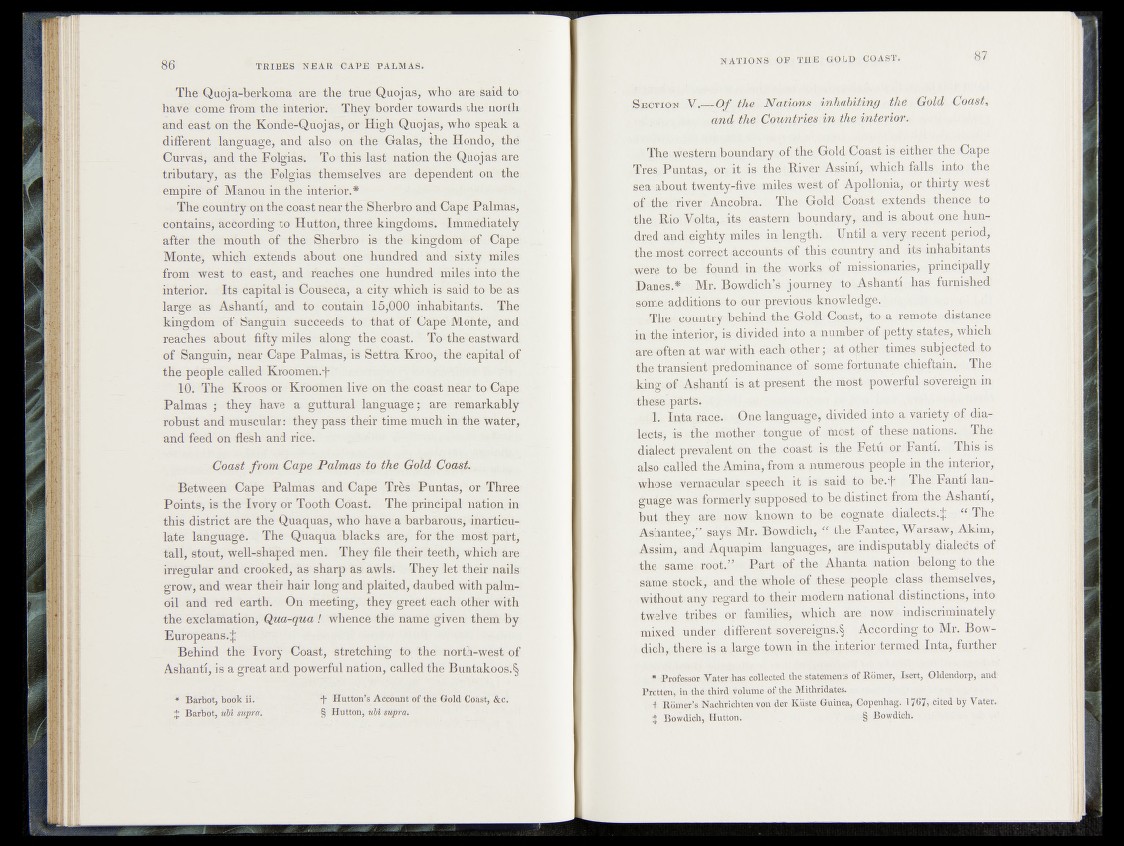
The Quoja-berkoma are the true Quojas, who are said to
have come from the ihteridr.- They border towards the north
and east on the Konde-Qiiojhs, or High Quojas, who speak a
different language, and also on the Galas*' the Hondo, thé
Curvas, and the Folgias*. To this last nation the Quojas are
tributary, as the Fblgias themselves are dependent oh the
empirë'of Manou in the ihtêffeh*
The country oii the coast near the Sherbro and Cape Palmas,
contains, according to Hutton, three kingdoms. Immëdiately
after the mouth of the Sherbro is the kingdomfeif Cipe
Monte* which extends about one hundred and sixty miles
from west to east, and Teaches one hundred miles intd the
interior. Its capital is Coüseèa, a city which is said to be as
large as Ashanti, and to contain 15,000 inhabitants; The
kingdom oFSanguin succeeds to that of Cape Monte, and
reaches about fifty miles along the coast. To the eastward
of Sanguin, near Cape Palmas, is Settra Kroo, the capital of
the people called Kroomen.f
1Ö. The Kroos or Kroomen live on the coast near to Cape
Palmas ; they have a guttural language j are remarkably
robust and muscular: they pass their time much in the water,
and feed on flesh and rice.
Coast from Cape Palmas to the Gold Coast.
Between Cape Palmas and Cape Très Puntas, or Three
Points, is the Ivory or Tooth Coast. The principal nation in
this district are the Quaquas, who have a barbarous, inarticulate
language. The Qtiaqua blacks are, for the most paît,
tall, stout, well-shaped men. They file their teeth* which are
irregular and crooked, as sharp as awls. They let their nails
grow, and wear their hair long and plaited, daubed with palm-
oil and red earth. On meeting, they greet each other with
the exclamation, Qua-qua ! whence the name given them by
Europeans.^
Behind the Ivory Coast, stretehing to the north-west of
Ashanti, is a great and powerful nation, called the Buntakoos.§
* Barbot, book ii.
+ Bärbot, ubi supra.
■f Hutton's Account óf the Gold Coast, &c.
§ Hutton, ubi supra.
Section Y.—Of the Nations mhatytifkg: the Gold Coasts
and the^ Countries in 4he: interior.
The Western boundary of the Gold Coast is either the Cape
Tres Puntas, or^it is the Fiver Assini, which fiiils into the
sea about twenty-five miles west of Apollonda* or thirty west
of the 'river Aneofera. ■ The Gold. Coast extends. thence to
the Fio, Volta, .its: eastern boundary, and is about ohe hundred
and eighty mile® in lea$glh<-. <, Until a period,
the .most correct accounts of this country and its inhabitants
,w©r# to be found' in the works of m^rionarit^, principally
Hanes.* Mr. Bowdich’s journey ftp! Ashanti, has furnished'
some additions to our previous kmowledgg.J-y;
The country behind the Gold Coast, to a remote distance?
in the interior, is. divided into a numbes*of petty, states, which
are often at war with each other; a t othersthbe^ subjected Jo
the transient predominance of some fortunate chieftain. The;
khignfAshanti is at present the most powerful. sovereign in
these parts. t
1. Inta race. One lang.uage, divided into a variety of dialers*
is the mother tongue of most of these nations.. The
dialect prevalent on the .coast, is the FetfibsarFantho This is
also called the Aminarfram a numerous people in the inferior.,
whose vernacular speech it is said to he.p rl he. Fanti language
was formerly supposed to-he. distinct from the* Ashanti,
hut they are now known to be. cognate dialeetsLj “ The
Ashantee,” says Mr. Bowdich, “ the Fantee, Warsaw, Akim,
Assim, and Aquapim languages, are indisputably dialectsof
the same • root.” Part of the Abanta nation belong to .the |
same stock, and the whole of these, people class themselves,
without any regard to their modem national .distinctions, into:
twelve tribes or- families, which are naw indiscriminately
mixed under different sovereigns.^ According* to Mr. Bowdich,
there is a large town in the.mterior .termed Inta, further
* Professor Yater has collected .the statemejMS ofB&inst, Isert, Oldandorp, and
Protten, in the third volume of the Mithridates.
+ Romer’s Maehficihten von der Kiiste Guinea, Copenhag. 1767, cited by Yater.
| Bowdich, Hutton. . .§. Bowdich.